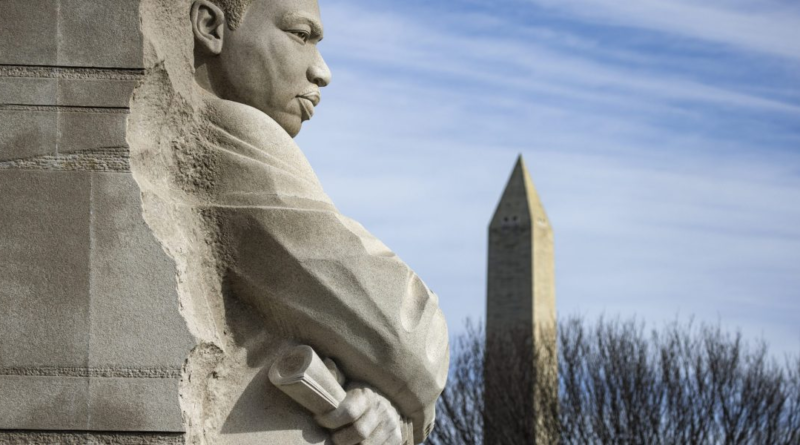Bad-faith reverse-discrimination claims hurt America’s economic future and global standing
There was a time when cotton was king and Black slave labor built the stature and wealth of America, a brutal time in history the legacy of which stubbornly persists to this day in our economic, political, legal, and education systems.
Confronted with these ugly truths, our country has an opportunity to repair generations of harm. Instead, I fear we are headed down a more destructive path–not only denying our history but doubling down on the discrimination that has for so long denied Black Americans their share of the American dream. In doing so, we are crippling our economy with our own hypocrisy–and tarnishing America’s international standing as others reckon more honestly with their past.
From slavery to the Jim Crow South, redlining to the destruction of Black Wall Street, America has spent centuries profiting from Black labor while denying and destroying Black prosperity. The inevitable result: staggering financial inequality, with the average white family accruing 10 times more wealth than Black families, and Black people holding just 2% of national wealth and controlling less than half of one percent of capital in America.
This is no mere echo of historical transgressions–it is a reflection of ongoing barriers to success, including a criminal justice system that incarcerates Black Americans at five times the rate of whites and societal bias that has reduced them to a negligible presence in corporate C-suites. Presidents Johnson and Nixon started down the path to righting some of these wrongs with the U.S. government’s Black Capitalism program, but that ended almost as swiftly as the false promises to address race-based wealth and social inequality that came after George Floyd’s murder.
It is against this backdrop that a vocal faction of Americans has the audacity to cry “reverse discrimination,” so threatened by the country’s meager efforts to atone for its sins that they seek to hide its history of oppression. Their efforts extend beyond banning books and corrupting curriculums to twisting the same legal tools originally designed to remedy civilian and government oppression of Black people to instead put even more weight on those attempting to climb from the basement of America’s economic pecking order.
Recently, the activist whose efforts overturned affirmative action, eliminating yet another vehicle for marginalized populations’ educational and economic success, filed a lawsuit against a small, Black-owned American venture capital firm over its efforts to support Black women entrepreneurs. Never mind that they receive just 0.06% of all venture capital–less than 1/1000th of their percentage of the American population—or that white men under 35 have 224 times the wealth of Black women under 35.
To this litigant and his ilk, any attempt to acknowledge the roots of this gross inequity, much less adopt a targeted approach to remedy it, is a threat. They so aggressively defend the unequal status quo because they cannot bear the alternative: facing the abominable discrimination and oppression under de facto affirmative action for white people that has created the conditions for Black women’s inability to attract venture capital. Instead, they attack, deflect, deny, and hide historical truth and consequences.
This willful ignorance is geopolitically self-destructive and irresponsible, as today’s world order is determined by the productive and innovative power of a nation’s human capital, which drives national wealth. Keeping players off the field for ideological and racist reasons will only hold America back, while other countries steamroll ahead by tapping the full potential of all the talent at their disposal.
Our allies across the Atlantic have taken an approach worthy of emulation. In acknowledgment of its historical investment in the transatlantic chattel slave trade, the Church of England recently announced a £100 million program of impact investing, grant-making, and research with the target of alleviating the ongoing consequences of its past actions. As a member of the fund’s Oversight Group, I am heartened by the symbolic financial investment but even more moved by the Church Commissioners’ commitment to truth and reconciliation. England has taken a step in the right direction, but America’s inaction and retrenchment is a catapult backward–and a costly one.
Race-based discrimination is estimated to have set America back over $50 trillion since 1990 alone. Other estimates forecast that eliminating race-based discrimination would generate 6 million jobs and $5 trillion in American economic power in just five years.
If Americans care about global economic power, moral authority, and reputation, we must explore the nation’s ugly history of targeted Black oppression, calculate the wealth transferred through exploitation and extraction, and invest in a plan for a better future in the spirit of patriotic capitalism.
It’s time to stop using bad faith claims of reverse discrimination as a polarizing wedge and give everyone opportunities and resources to unleash their potential for the sake of the nation. And everyone has a role to play. In addition to more equitable laws and policies, we need investors to become patriotic capitalists and put market rate-seeking impact investments to work to erase the compounding economic and social damage inflicted on Black people and others oppressed because of their race.
Contrary to the zero-sum claims of history-denying capital hoarders, a more just country is a more prosperous country, too. And we all win when we all win.
Roy Swan is the head of mission investments at the Ford Foundation.
More must-read commentary published by Fortune:
The opinions expressed in Fortune.com commentary pieces are solely the views of their authors and do not necessarily reflect the opinions and beliefs of Fortune.




